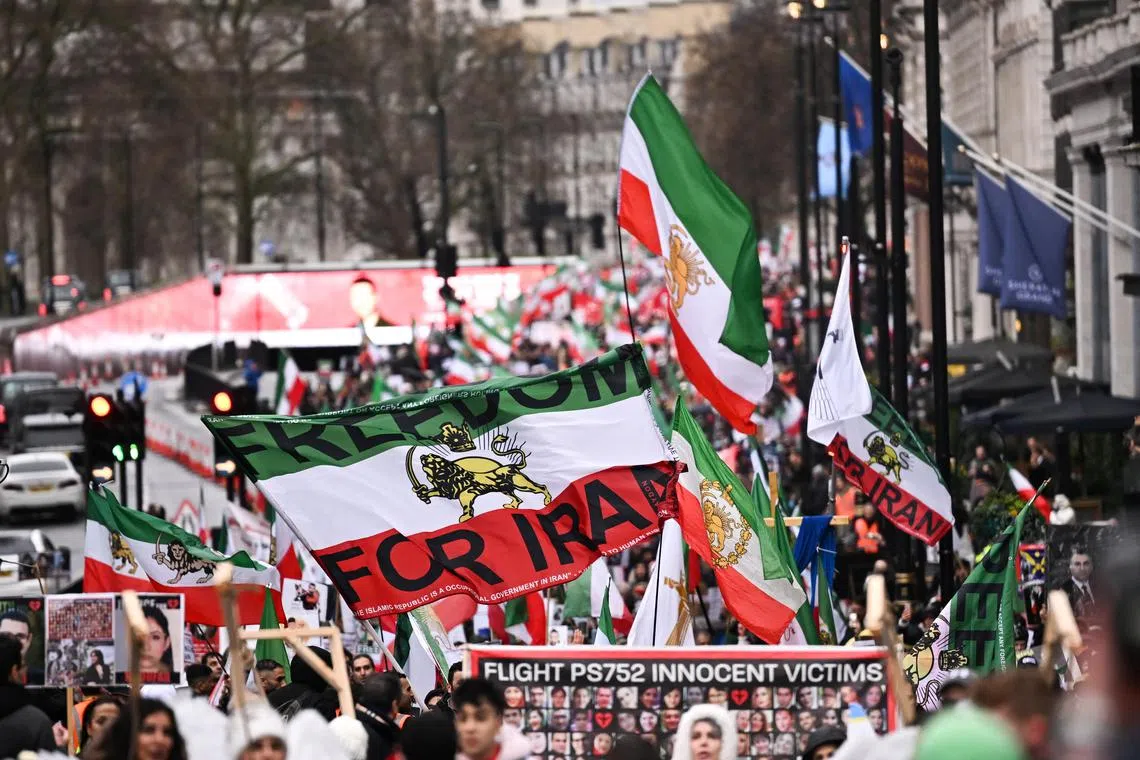Iran weaponising death penalty to strike fear, stamp out dissent: UN
Sign up now: Get ST's newsletters delivered to your inbox

Demonstrators take part in an Iran solidarity rally in London meant to denounce the execution of pro-democracy protesters.
PHOTO: REUTERS
GENEVA – The United Nations’ human rights chief has accused Iran’s government of weaponising the death penalty to strike fear among Iranians and stamp out dissent, saying the executions amounted to “state-sanctioned killing”.
“The weaponisation of criminal procedures to punish people for exercising their basic rights – such as those participating in or organising demonstrations – amounts to state-sanctioned killing,” UN High Commissioner for Human Rights Volker Turk said, adding that the executions violated international human rights law.
He said in a statement that there were numerous violations of due process and fair trial in the cases, including the application of vaguely worded criminal provisions, denial of access to a lawyer of choice, forced confession under torture and denial of a meaningful right of appeal.
Iran has sentenced three more men to death and sentenced the activist daughter of former Iranian president Akbar Hashemi Rafsanjani to five years in prison for offences related to the civil unrest triggered by the death of Ms Mahsa Amini,
The latest sentences – for three men who were convicted of the killings of three members of the security forces – bring to 17 the official total of detainees condemned to death in connection with nearly four months of protests.
Four executions have been carried out,
The lawyer for Ms Faezeh Hashemi, Mr Rafsanjani’s daughter, did not give details of the charges against her. But Teheran’s public prosecutor indicted her in 2022 on charges of “propaganda against the system”, according to the semi-official ISNA news agency.
State media in September reported she was arrested for “inciting riots” in Teheran
The demonstrations have posed one of the biggest challenges to Iran’s clerical rulers since the 1979 revolution.
“Following the arrest of Ms Faezeh Hashemi, she was sentenced to five years in prison, but the sentence is not final,” defence lawyer Neda Shams wrote on her Twitter account.
In 2012, Ms Hashemi was sentenced to jail and banned from political activities for “anti state propaganda” dating back to the 2009 disputed presidential election.
Her father died in 2017.
Mr Rafsanjani’s pragmatic policies of economic liberalisation and better relations with the West attracted fierce supporters and equally fierce critics during his life. He was one of the founders of the Islamic Republic.
Ms Hashemi’s sentencing comes as Iran ordered three more men executed for offences related to the civil unrest triggered by Ms Amini’s death
Oslo-based group Iran Human Rights said on Monday at least 109 protesters now in detention have been sentenced to death or face charges that can carry capital punishment.
The Islamic republic has been rocked by a wave of protests


